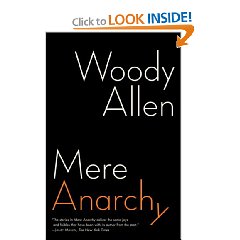 If you have not read any of Woody’s books, you might be surprised. He’s very smart and very literate, especially so within this latest effort. Yes, you have to pay attention and he uses big words. But don’t panic! He uses them for good. Actually, he uses them for humor, which is pretty much the same as good.
If you have not read any of Woody’s books, you might be surprised. He’s very smart and very literate, especially so within this latest effort. Yes, you have to pay attention and he uses big words. But don’t panic! He uses them for good. Actually, he uses them for humor, which is pretty much the same as good.
This book compiles eighteen or so short pieces, many of which published in various places but gathered together for the first time. From “Tandoori Ransom” to “Sam You Made The Pants Too Fragrant” to “On A Bad Day You Can See Forever” to “Above The Law, Below The Box Springs” to, well, maybe you get the idea. His stories are off-beat and unusual and not (as you might expect) full of easy jokes. Oh, but they are funny. Clever and funny, which is even better.
Here’s what Booklist had to say:
It’s been 25 years since Woody Allen’s last humor collection, and for lovers of the New Yorker “casual” (a blend of goofy personal essay and literary parody), that’s far too long. Most of these pieces appeared originally in the New Yorker , but there are a handful of originals as well, all of which will please those determined souls who like their humor distinctly old school (“On a Bad Day You Can See Forever,” a rant about the horrors of rehabbing a condo, begins with the narrator reading Dante and wondering why there is no circle in hell for contractors). The topsy-turvy literary allusions pour from Allen’s pen like bullets from a Gatling gun (an appropriately obscure simile), exposing the intellectual pretensions of a ragtag assortment of Allenesque everymen–endearingly unkempt nebbishes who, despite knowing their Dostoevsky, can’t quite deal with the absurdities of daily life. Take Flanders Mealworm, the unfairly unheralded author of The Hockfleisch Chronicles, who, desperate for cash, agrees to write a novelization of a Three Stooges movie: “Calmly and for no apparent reason, the dark-haired man took the nose of the bald man in his right hand and slowly twisted it in a long, counterclockwise circle.” If Larry, Moe, and Curly Joe weren’t exactly what Yeats had in mind when he used the phrase “mere anarchy” in “The Second Coming,” they should have been. Bill Ott
Copyright © American Library Association. All rights reserved
And consider this by Amazon reviewer Brad Shorr:
The two funniest books I ever read were “Without Feathers” and “Getting Even”, so my expectations were impossibly high for “Mere Anarchy.” But almost to my surprise, Woody Allen’s new book at least equals and maybe surpasses them both.
Allen’s writing skills are off the charts, whatever the genre. At times, his sentence structure is so intricate and precise, his vocabulary so eccentrically obscure, that his setups become funnier than his punchlines:
“I was supremely confident my flair for atmosphere and characterization would sparkle alongside the numbing mulch ground out by studio hacks. Certainly the space atop my mantel might be better festooned by a gold statuette than by the plastic dipping bird that now bobbed there ad infinitum…”
This particular vignette, “This Nib for Hire”, is particularly hilarious: the story of Flanders Mealworm, a pretentious, out of work novelist writing a novelization of a Three Stooges short.
In the later chapters, Allen drops the highly stylized prose and reverts to earlier form, where he simply piles absurdities on his paragraphs like pastrami on rye. This too is sidesplitting:
“How could I not have known that there are little things the size of ‘Planck length’ in the universe, which are a millionth of a billionth of a billionth of a centimeter? Imagine if you dropped one in a dark theater how hard it would be to find. And how does gravity work? And if it were to cease suddenly, would certain restaurants still require a jacket? …”
Allen is funny on every level:
Funny premises–“Frederich Nietzsche’s Diet Book”, Savile Row suits impregnated with fragrances, a lighting double kidnapped by Indian terrorists while on location.
Funny, perfectly drawn metaphors and similes–“I have also reviewed by own financial obligations, which have puffed up recently like a hammered thumb.” Or, “With that, he scribbled in an additional ninety thousand dollars on the estimate, which had waxed to the girth of the Talmud while rivaling it in possible interpretations.”
Funny character names–Hal Roachpaste, Reg Millipede, Agememnon Wurst and E. Coli Biggs, to name a very, very few.
Funny words–Myrmidon, crepescular, succubus, screed, vigorish, on and on.
And of course, funny jokes, everywhere–“She quarreled with the nanny and accused her of brushing Misha’s teeth sideways rather than up and down.” “As we know, for centuries Rome regarded the Open Hot Turkey Sandwich as the height of licentiousness …”
Allen is the absolute master of fusing the sublime with the absurd. The result is a book that makes you think as well as laugh. That’s a combination you don’t often see these days!
So, you get it. It’s funny, witty, clever, and you should buy it along with all his other books. Trust me. Anyway, if you have (or haven’t) read the book, leave me a comment!
